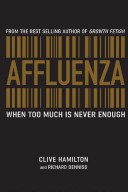Overconsumption describes a situation where a consumer overuses their available goods and services to where they can't, or don't want to, replenish or reuse them. In microeconomics, this may be described as the point where the marginal cost of a consumer is greater than their marginal utility. The term overconsumption is quite controversial in use and does not necessarily have a single unifying definition. When used to refer to natural resources to the point where the environment is negatively affected, is it synonymous with the term overexploitation. However, when used in the broader economic sense, overconsumption can refer to all types of goods and services, including manmade ones, e.g. "the overconsumption of alcohol can lead to alcohol poisoning". Overconsumption is driven by several factors of the current global economy, including forces like consumerism, planned obsolescence, economic materialism, and other unsustainable business models and can be contrasted with sustainable consumption.
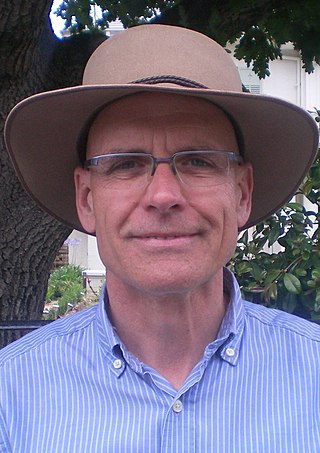
Clive Charles Hamilton AM FRSA is an Australian public intellectual and Professor of Public Ethics at the Centre for Applied Philosophy and Public Ethics (CAPPE) and the Vice-Chancellor's Chair in Public Ethics at Charles Sturt University. He is a member of the Board of the Climate Change Authority of the Australian Government, and is the Founder and former Executive Director of The Australia Institute. He regularly appears in the Australian media and contributes to public policy debates. Hamilton was granted the award of Member of the Order of Australia on 8 June 2009 for "service to public debate and policy development, particularly in the fields of climate change, sustainability and societal trends".

Growth Fetish is a book about economics and politics by the Australian progressive political theorist Clive Hamilton. Published in 2003 it became a best-seller in Australia.
In social behavior, downshifting is a trend where individuals adopt simpler lives from what critics call the "rat race".

Clive James was an Australian critic, journalist, broadcaster, writer and lyricist who lived and worked in the United Kingdom from 1962 until his death in 2019. He began his career specialising in literary criticism before becoming television critic for The Observer in 1972, where he made his name for his wry, deadpan humour.
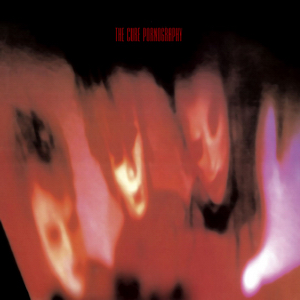
Pornography is the fourth studio album by English Rock band the Cure, released on 4 May 1982 by Fiction Records. Preceded by the non-album single "Charlotte Sometimes", it was the band's first album with new producer Phil Thornalley, and was recorded at RAK Studios from January to April 1982. The sessions saw the band on the brink of collapse, with heavy drug use, band in-fighting, and frontman Robert Smith's depression fueling the album's musical and lyrical content. Pornography represents the conclusion of the Cure's early dark, gloomy musical phase, which began with their second album Seventeen Seconds (1980).
Affluenza is a pseudoscientific psychological malaise supposedly affecting wealthy people. It is a portmanteau of affluence and influenza, and is used most commonly by critics of consumerism. It is not a medically recognized disease. The word is thought to have been first used in 1954, but was popularised in 1997 with a PBS documentary of the same name and the subsequent book Affluenza: The All-Consuming Epidemic. These works define affluenza as "a painful, contagious, socially transmitted condition of overload, debt, anxiety, and waste resulting from the dogged pursuit of more". A more informal definition of the term would describe it as "a quasi-illness caused by guilt for one's own socio-economic superiority". The term "affluenza" has also been used to refer to an inability to understand the consequences of one's actions because of financial privilege.

Alan McCrae Moorehead, was a war correspondent and author of popular histories, most notably two books on the nineteenth-century exploration of the Nile, The White Nile (1960) and The Blue Nile (1962). Australian-born, he lived in England, and Italy, from 1937.
The Australia Institute is a public policy think tank based in Canberra, Australia. Since its launch in 1994, it has carried out research on a broad range of economic, social, and environmental issues.
Toby Creswell is an Australian music journalist and pop-culture writer. He was editor of Rolling Stone (Australia) and a founding editor of Juice.

Scorcher: The Dirty Politics of Climate Change is a 2007 book by Clive Hamilton which contends that Australia rather than the United States is the major stumbling block to a more effective Kyoto Protocol. In the final chapter of the book Hamilton argues that "the Howard government has been actively working to destroy the Kyoto Protocol".
Post-consumerism is a view or ideology that well-being, as distinct from material prominence, is the aim of life, and often suggesting that there is a growing willingness to assert such. Post-consumerism can also be viewed as moving beyond the current model of addictive consumerism. This personal and societal strategy utilizes each individual's core values to identify the "satisfaction of enough for today," also called "self-defined enoughness." The intent and outcome of this basic strategy to date has "reached people where they are rather than simply where we are." Therefore the campaign "is promoting this intriguing question" regardless of the answer: Do I have enough stuff for now?
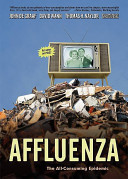
Affluenza: The All-Consuming Epidemic is a 2001 anti-consumerist book by John de Graaf, environmental scientist David Wann, and economist Thomas H. Naylor. Viewing consumerism as a deliberately spread disease, the book consists of three parts—symptoms, origins, and treatment. Affluenza is described as "a painful, contagious, socially transmitted condition of overload, debt, anxiety, and waste resulting from the dogged pursuit of more".
What's Left? The Death of Social Democracy is written by Australian Professor Clive Hamilton and was published as Issue 21 of the Quarterly Essay in 2006. In What's Left? Hamilton comments on topics written about in his previous books Growth Fetish and Affluenza: When Too Much is Never Enough. He argues that there is an emergence of new forms of "alienation and exploitation", and what he calls the ravages of the free market and the profit motive. According to Hamilton, they have "robbed life of its meaning".

Richard Denniss is the Executive Director of The Australia Institute. He is a prominent Australian economist, author and public policy commentator, and a former Associate Professor in the Crawford School of Public Policy at the Australian National University in Canberra, Australia. Denniss was described by Mark Kenny in the Sydney Morning Herald as "a constant thorn in the side of politicians on both sides due to his habit of skewering dodgy economic justifications for policy". In October 2018, The Australian Financial Review listed Denniss and Ben Oquist of The Australia Institute as equal tenth-place on their 'Covert Power' list of the most powerful people in Australia.
Sarah Maddison CF is an Australian author and political scientist.
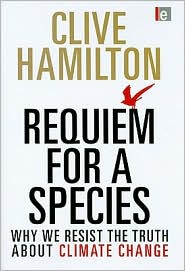
Requiem for a Species: Why We Resist the Truth about Climate Change is a 2010 non-fiction book by Australian academic Clive Hamilton which explores climate change denial and its implications. It argues that climate change will bring about large-scale, harmful consequences for habitability for life on Earth including humans, which it is too late to prevent. Hamilton explores why politicians, corporations and the public deny or refuse to act on this reality. He invokes a variety of explanations, including wishful thinking, ideology, consumer culture and active lobbying by the fossil fuel industry. The book builds on the author's fifteen-year prior history of writing about these subjects, with previous books including Growth Fetish and Scorcher: The Dirty Politics of Climate Change.

Benjamin Richard "Ben" Oquist is a policy analyst, commentator and political and communications strategist.
Affluenza is a term used by critics of consumerism.

Jasmin Singer is an American animal rights activist. Since 2022, she has been the host of Weekend Edition for WXXI, Rochester, NY's NPR member station. She is the co-founder of the non-profit organization and podcast Our Hen House, serves as editor-at-large of VegNews, and is the former Vice President of Editorial at Kinder Beauty. She also supports LGBTQ+ and overlapping social justice issues.
